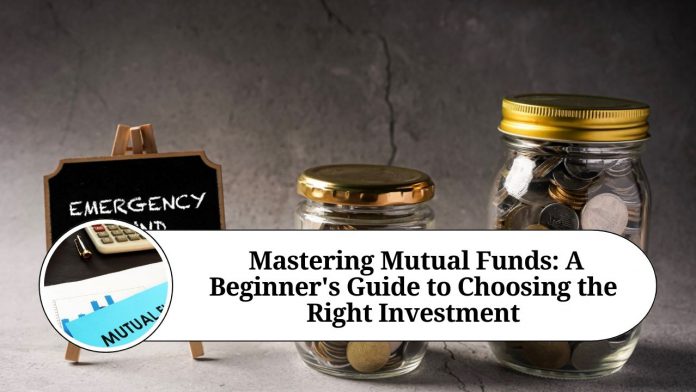Mutual funds are an excellent investment tool for those who want to participate in the stock market without having to pick individual stocks. They offer diversification, professional management, and can help you achieve your financial goals. However, with thousands of mutual funds available in the market, choosing the right one can be overwhelming. In this blog, we will discuss some essential factors to consider when selecting a mutual fund.
Identify your investment objective
The first step to choosing a mutual fund is to identify your investment objective. Ask yourself what your financial goals are and how much risk you are willing to take to achieve them. For example, if you’re saving for a short-term goal, such as a down payment on a home, you may want to invest in a low-risk fund. On the other hand, if you’re investing for retirement, you may be willing to take on more risk for higher potential returns.
Look at the fund’s performance
When evaluating a mutual fund, it’s essential to look at its historical performance. Look at the fund’s returns over the past three, five, and ten years to get an idea of how it has performed over time. However, past performance is not a guarantee of future results, so make sure you consider other factors as well.
Evaluate the fund’s fees
Mutual funds charge fees, including expense ratios, sales charges, and redemption fees. The expense ratio is the annual fee that the fund charges to cover its operating expenses. Sales charges, also known as loads, are fees that you pay when you buy or sell a mutual fund. Redemption fees are charged when you sell your mutual fund shares shortly after purchasing them. Make sure you understand the fees associated with the mutual fund you’re considering, as they can significantly impact your returns over time.
Consider the fund’s investment style
Mutual funds can be categorized by investment style, such as value, growth, or blend. Value funds typically invest in companies that are undervalued by the market, while growth funds focus on companies with high growth potential. Blend funds invest in a mix of both value and growth stocks. Make sure you choose a fund that aligns with your investment style and objectives.
Look at the fund’s holdings
When evaluating a mutual fund, it’s essential to look at the underlying holdings. Make sure the fund is invested in companies and industries that you’re comfortable with and align with your investment objectives. You can typically find this information in the fund’s prospectus or on its website.
Check the fund’s management team
The management team is responsible for making investment decisions for the mutual fund. Look for a management team with a proven track record of success and experience in the industry. You can typically find information about the management team on the fund’s website.
conclusion
choosing the right mutual fund requires careful consideration of several factors, including your investment objective, the fund’s performance, fees, investment style, underlying holdings, and management team. By evaluating these factors, you can select a mutual fund that aligns with your investment objectives and helps you achieve your financial goals. Remember to regularly monitor your mutual fund’s performance and make adjustments as needed.
Other Related Blogs: Section 144B Income Tax Act
Frequently Asked Questions (FAQs)
Q: What is the difference between a stock and a mutual fund?
A: A stock represents ownership in a single company, while a mutual fund is a collection of stocks, bonds, or other securities managed by a professional fund manager on behalf of investors.
Q: What is a 401(k) plan?
A: A 401(k) plan is a retirement savings plan sponsored by an employer. It allows employees to contribute a portion of their pre-tax salary to the plan, and employers may also provide matching contributions. The contributions grow tax-free until withdrawal, typically after age 59 1/2.
Q: What is an IRA?
A: An IRA, or individual retirement account, is a retirement savings account that individuals can contribute to on their own. There are two types of IRAs: traditional and Roth. A traditional IRA allows pre-tax contributions that grow tax-free until withdrawal, while a Roth IRA allows after-tax contributions that grow tax-free and can be withdrawn tax-free in retirement.
Q: What is diversification?
A: Diversification is a strategy of spreading out investments across different asset classes and sectors to minimize risk. By diversifying your portfolio, you can reduce the impact of a single stock or market downturn on your overall portfolio.
Q: What is compound interest?
A: Compound interest is interest that is calculated on the initial principal and any accumulated interest. In other words, interest is earned on interest. Compound interest can help investments grow faster over time.
Q: What is a credit score?
A: A credit score is a three-digit number that represents a person’s creditworthiness. It is based on their credit history and ranges from 300 to 850. A higher credit score indicates better creditworthiness, making it easier to obtain loans and credit at favorable rates.
Q: What is budgeting?
A: Budgeting is the process of creating a plan for how you will allocate your income and expenses. By budgeting, you can track your spending, prioritize your expenses, and save money for your goals.
Q: What is the difference between a savings account and a checking account?
A: A savings account is designed for storing money for future use and typically earns interest. A checking account is designed for everyday transactions, such as paying bills and making purchases, and often has lower or no interest rates.
Q: What is an emergency fund?
A: An emergency fund is a savings account specifically designed to cover unexpected expenses, such as job loss, medical bills, or home repairs. Financial experts recommend having three to six months’ worth of living expenses in an emergency fund.




















